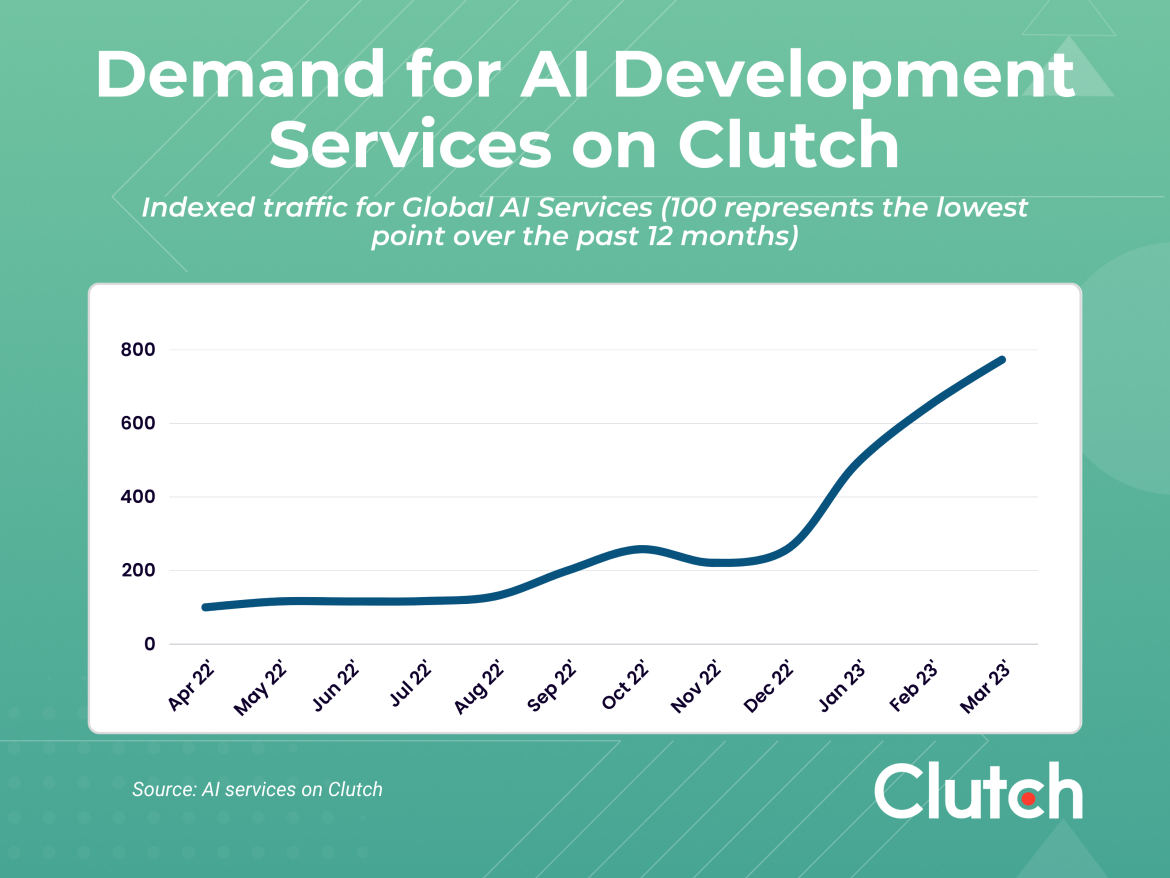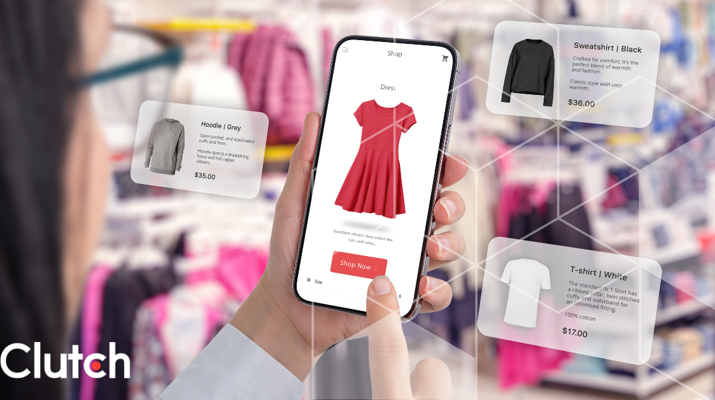

Updated February 14, 2026
More businesses than ever are investing in artificial intelligence, with 35% of decision-makers saying AI development and implementation is their top business priority. As demand grows, many organizations are turning to outsourced service providers to accelerate AI integration. If you're considering this route, here's how to identify the right partner for your AI project.
The generative AI craze is transforming businesses of all sizes and across industries.
Business service providers are quickly re-orienting their teams to meet the surging demand for AI guidance and expertise as clients look to navigate these new capabilities.
Looking for a Artificial Intelligence agency?
Compare our list of top Artificial Intelligence companies near you
“We believe that the rise of AI tools like ChatGPT is significantly influencing the types of projects clients are pursuing,” said JP Lorandi, CTO of Azumo, a development company. “Clients are increasingly interested in harnessing AI to optimize their operational workflows.”
In 2023, Clutch data showed that demand for artificial intelligence development services has grown over 514% YoY in the first quarter of that year, and the surge continues to rise.

Things have certainly changed since that data was found. AI has become a more prominent topic for businesses in all industries.
In a recent Clutch survey of 1,000 business decision-makers, we found that AI was still in demand for businesses, with 35% of respondents stating that AI development and implementation are integral to their business.
With strong and growing interest in artificial intelligence, businesses investing in AI must ensure they’re choosing the right service provider.
Learn why more companies are investing in artificial intelligence and the important considerations that should be made when selecting an AI service provider.
While AI capabilities have advanced significantly, many businesses, especially in highly regulated industries like healthcare, education, and financial services, still struggle to identify the most practical and compliant use cases. With so many proven and emerging applications, the challenge isn’t whether AI can help, but how to utilize it to support business goals, regulatory requirements, and long-term value.
The possibilities are still evolving, which is one reason why it’s so hard to figure out what the best use case might be in any given market. For example, accountants offering tax services is a great example of how to ideate potential use cases in a highly standardized industry.
“Take the tax advisory market as an example: much of the information for tax advice in the U.S. is well-understood and documented through tax codes, legal rulings, and publicly available opinion letters,” said Lorandi. “By leveraging AI to analyze this wealth of information, virtual assistants could be created to support the existing tax advisory market, greatly impacting the capabilities of individual professionals."
Read more: 'Why 1 in 4 Businesses Plan to Outsource Digital Marketing'
Some of the most in-demand AI applications currently include robotics, machine learning, chatbots, generative AI, AI agents, and natural language processing (NLP).
Artificial intelligence services benefit businesses by increasing operational efficiency, improving customer service, and generating long-term cost savings.
“Many of our clients have used our team to build chatbots and NLP systems,” said Lorandi. “We’ve seen how they’ve improved customer service by responding to routine inquiries instantly, reducing the workload for human agents.”
Lorandi continues that AI solutions like chatbots have helped their clients save money, streamline processes, and increase satisfaction, which has allowed them to focus more on growth and innovation.
Related Reading: ‘Artificial Intelligence Pricing Guide’
Are you looking for a service provider that can help your company ideate an in-house product or take AI technology right to market?
Selecting the right service provider for your company will bring your AI concept to new heights, but where do you begin when vetting companies to tackle your AI plans and initiatives?
1. Identify your needs before reaching out to an AI service provider.
The problem you’re trying to solve needs to be well-documented. Knowing your pain points can help create a roadmap that anticipates any challenges that might arise. Having an understanding of potential pain points can also help inform decision-making when selecting the right service provider that will deliver the correct guidance and ensure a successful AI project from start to finish.
2. Determine where you need help most.
Are you looking for a provider to help you test a proof of concept with users and ideate to build something in-house, or do you have a concept in mind and need help taking an AI technology fully to market?
3. Look for AI companies with experience in your industry.
It’s much easier to work with an AI partner who has a deep understanding of your business out of the gate. They will likely be familiar with your pain points and have already worked on solving some of them. This first-hand experience is extremely valuable and could mean shipping to production more quickly.
4. Evaluate how well the service provider will work with your internal team of engineers.
In any AI development project, all parties will be working closely together. A service provider should act as an extension of your engineering team in order to achieve the best possible outcome. Communication, collaboration, and a clear understanding of roles and responsibilities are essential for a successful partnership.
Read this: 'Inside the AI Hiring Shakeup: What AI in Recruitment Means for Your Org'
5. Ask the service provider about their expertise in usability testing and de-risking your AI launch.
The scope and scale of data to fully train an AI can also be costly. A faulty user experience on an AI tool can lead to major issues for a business, so be sure you’re covering all of the bases when scoping out a shortlist of service providers.
6. Get their stance on ethical applications of AI and how they will protect your data privacy requirements.
A reputable AI service provider can demonstrate expertise in the implications of AI and will be forthcoming with their best practices. Their team should be committed to protecting your business’s reputation and data by including the right ethical barriers and ensuring all legal requirements are met with the utmost care and attention to detail.
Consider your data privacy requirements when building a specialized AI tool and the data the provider will need to access to execute your project successfully.
7. Confirm the scope and scale of data required to train the AI because it’s a cost driver.
Many AI companies factor in delivery time, demonstrations, technical studies, number of revisions, and other reporting into their workflows with clients, but that’s not the biggest line item; It’s the amount of data required.
How much is enough? ChatGPT uses 570 GB of data. While you likely won’t need that much, you will need approximately 25% the size of your training data set.
AI adoption has accelerated rapidly in the past few years – businesses are increasingly turning to specialized AI development firms to stay competitive. Our data found that more business decision makers now view AI development and implementation as the most integral component of meeting their business needs. This is a clear signal that AI is no longer a luxury, but a strategic necessity.
Clutch’s data reflects this surge in demand, but as more providers enter the space, businesses face a growing challenge: distinguishing true expertise from empty promises. While emerging AI technologies offer exciting potential, they also come with uncertainty.
Choosing the right AI development partner can make all of the difference. To reduce risk and maximize ROI, it’s important to evaluate a company’s experience, technical capabilities, and pricing transparency. A well-aligned partner not only helps you implement AI responsibly and effectively.
With careful research, a clear understanding of your goals, and the right questions, you can confidently select an AI provider that delivers real value to your business.
Hire one of our trusted artificial intelligence companies or browse top AI services packages to take your business to the next level.


